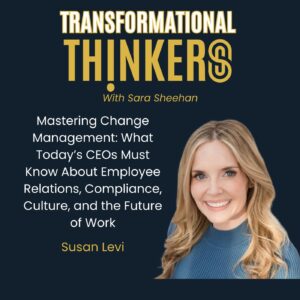Sara Sheehan’s guest in this episode is Terry Tucker, a speaker, international podcast guest on the topic of motivation, and author of “Sustainable Excellence: Ten Principles to Leading Your Uncommon and Extraordinary Life”. Terry has a storied history including working as a marketing executive, hospital administrator, and SWAT hostage negotiator, in addition to surviving cancer. Sara and Terry talk about his books, his cancer journey, and why communication and connection are vital to living extraordinary lives.
Our job doesn’t always have to embody our purpose, which is a lesson Terry learned through living and now widely shares. He stresses that we should lean into our soul’s purpose to fulfill our lives. He also learned the secrets to effective communication through his time as a hostage negotiator and explains why the 7% how you communicate, 38% words you say, and 55% body language and expressions formula is so important to consider. Of course, a large part of communication is listening and that leads to greater connection, which Terry says is his greatest focus in life currently.
Sara Sheehan and Terry Tucker explore how to foster deeper connections and why those connections are so important to both life and success. Terry reflects on his cancer journey by discussing how life will always bring us challenges and adversity and that it’s how we rise from adversity and what we learn from it that defines us going forward. Sara Sheehan learns that Terry wouldn’t change the course of his life because he believes cancer made him a better person and that his next book will focus on being of service to ourselves, our families and friends, and our communities. This motivational episode is not to be missed.
About Terry Tucker:
Terry Tucker is a sought-after speaker who believes in the power of a good story to motivate, inspire, and encourage others to lead their uncommon and extraordinary lives.
By combining his twelve-year cancer journey with his diverse business, athletic coaching, and law enforcement expertise, he delivers compelling yet relatable presentations for conferences, virtual events, panels, meetings, and seminars.
Terry is the Founder of Motivational Check LLC and has a Bachelor of Science degree in Business Administration from The Citadel and a Master’s degree from Boston University.
He has been an NCAA Division I college basketball player, a marketing executive, a hospital administrator, a customer service manager, a SWAT Hostage Negotiator, a business owner, a high school basketball coach, and a cancer warrior.
He is the author of the book Sustainable Excellence, Ten Principles To Leading Your Uncommon and Extraordinary Life. Terry has been featured in Authority, Thrive Global, and Human Capital Leadership magazines. In addition, he is quoted in the new book, Audaciousness, Your Journey To Living A Bold And Authentic Life by Maribel Ortega and Helen Strong
—
Resources discussed in this episode:
- “Supercommunicators: How to Unlock the Secret Language of Connection” by Charles Duhigg
- “The Anxious Generation” by Jonathan Haidt
- “Do Hard Things” by Steve Magness
__
Contact Sara Sheehan | Sara Sheehan Consulting:
Contact Terry Tucker:
- Website: MotivationalCheck.com
- Book: “Sustainable Excellence: Ten Principles To Leading Your Uncommon And Extraordinary Life” by Terry Tucker
- YouTube
Hosted by Simplecast, an AdsWizz company. See pcm.adswizz.com for information about our collection and use of personal data for advertising.


